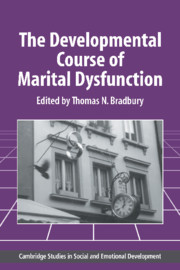Book contents
- Frontmatter
- Contents
- List of Contributors
- Foreword
- Introduction: The Developmental Course of Marital Dysfunction
- Part I Conceptual and Empirical Contributions
- 1 Communication in Early Marriage: Responses to Conflict, Nonverbal Accuracy, and Conversational Patterns
- 2 Marital Aggression, Quality, and Stability in the First Year of Marriage: Findings from the Buffalo Newlywed Study
- 3 Accommodation Processes During the Early Years of Marriage
- 4 The Psychological Infrastructure of Courtship and Marriage: The Role of Personality and Compatibility in Romantic Relationships
- 5 Happiness in Stable Marriages: The Early Years
- 6 Developmental Changes in Marital Satisfaction: A 6-Year Prospective Longitudinal Study of Newlywed Couples
- 7 The Development of Marriage: A 9-Year Perspective
- 8 Premarital Predictors of Relationship Outcomes: A 15-Year Follow-up of the Boston Couples Study
- 9 Optimizing Longitudinal Research for Understanding and Preventing Marital Dysfunction
- 10 Socialization into Marital Roles: Testing a Contextual, Developmental Model of Marital Functioning
- 11 Physical Aggression in Marriage: A Developmental Analysis
- Part II Invited Commentaries
- Author Index
- Subject Index
1 - Communication in Early Marriage: Responses to Conflict, Nonverbal Accuracy, and Conversational Patterns
Published online by Cambridge University Press: 13 October 2009
- Frontmatter
- Contents
- List of Contributors
- Foreword
- Introduction: The Developmental Course of Marital Dysfunction
- Part I Conceptual and Empirical Contributions
- 1 Communication in Early Marriage: Responses to Conflict, Nonverbal Accuracy, and Conversational Patterns
- 2 Marital Aggression, Quality, and Stability in the First Year of Marriage: Findings from the Buffalo Newlywed Study
- 3 Accommodation Processes During the Early Years of Marriage
- 4 The Psychological Infrastructure of Courtship and Marriage: The Role of Personality and Compatibility in Romantic Relationships
- 5 Happiness in Stable Marriages: The Early Years
- 6 Developmental Changes in Marital Satisfaction: A 6-Year Prospective Longitudinal Study of Newlywed Couples
- 7 The Development of Marriage: A 9-Year Perspective
- 8 Premarital Predictors of Relationship Outcomes: A 15-Year Follow-up of the Boston Couples Study
- 9 Optimizing Longitudinal Research for Understanding and Preventing Marital Dysfunction
- 10 Socialization into Marital Roles: Testing a Contextual, Developmental Model of Marital Functioning
- 11 Physical Aggression in Marriage: A Developmental Analysis
- Part II Invited Commentaries
- Author Index
- Subject Index
Summary
Although a clear relationship between marital satisfaction and marital communication has been established (for a review, see Noller & Fitzpatrick, 1990), little is known about the development of communication problems in marriage. In this chapter, we explore the development of couples' communication problems from the premarital stage through the first two years of marriage. We address three issues of theoretical and practical significance. First, what affects the stability of communication patterns and to what extent are problematic patterns of communication present before marriage? Second, to what extent are specific communication patterns related to concurrent and later satisfaction; in other words, are the communication patterns that are constructive in the short term also constructive in the long term? Third, in what direction does the link between communication and relationship satisfaction move; that is, do communication patterns drive relationship satisfaction, or does relationship satisfaction drive communication patterns? We address these issues in relation to three aspects of communication: responses to conflict, nonverbal accuracy, and conversational patterns.
Communication Problems and Relationship Satisfaction in Early Marriage
Development of Communication Problems
An important theoretical issue is whether the destructive communication patterns that lead to marital dissatisfaction are present premaritally, or whether such patterns develop over the course of marriage.
Information
- Type
- Chapter
- Information
- The Developmental Course of Marital Dysfunction , pp. 11 - 43Publisher: Cambridge University PressPrint publication year: 1998
Accessibility standard: Unknown
Why this information is here
This section outlines the accessibility features of this content - including support for screen readers, full keyboard navigation and high-contrast display options. This may not be relevant for you.Accessibility Information
- 40
- Cited by
